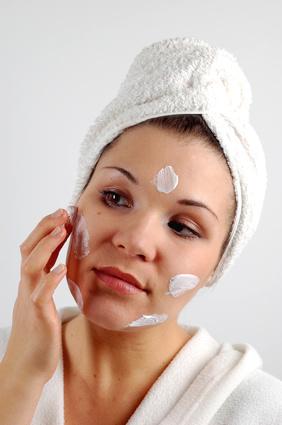Inflamed acnes goes beyond having an unsightly zit or pimple that clears up in a few days. When pimples become infected with bacteria, then the area affected becomes swollen and red. And while we all would like to believe this is a problem left behind with the awkward teenage years, it does commonly affect adult women. Changes in hormones during pregnancy, menstrual cycles and changes in the use of hormonal birth controls are common causes of inflamed acne, according to the Mayo Clinic. Luckily, there are several effective options for treating inflamed acne.
Nonprescription Options
Over-the-counter medications contain an ingredient such as salicylic acid or benzoyl peroxide that works by drying the skin and pores, thus killing the bacteria. The lotion is usually applied once or twice a day to the affected areas. These medications are the more mild option for treating inflamed acne and may not work for more severe cases. Common side effects are minimal with these creams, usually a drying or peeling of the skin, although the Mayo Clinic states that these side effects are often temporary.
Prescription Creams
Dermatologists use two types of prescription cream medications to treat inflamed acne. Creams made with high concentrations of vitamin A, such as Retin-A and antibiotic creams, are usually the first prescriptions to try if over-the-counter acne treatments are not effective against acne. Side effects are similar to the over-the-counter acne creams, although they may be more severe.
Prescription Oral Medications
When the cream acne medications have proved to be ineffective, or if your acne is severe enough, your doctor may recommend taking oral antibiotics or the oral medication isotretinoin (brand name Accutane). An upset stomach is one common side effect of this medication. While taking oral antibiotics is relatively safe, isotretinoin deserves more serious consideration before use. Isotretinoin is highly effective, but it is highly regulated because of serious potential side effects such as birth defects, vision changes and liver problems, the Mayo Clinic reports.
Birth Control
Changing your birth control methods may cause inflamed acne, but sticking to one birth control pill may improve your acne. Sometimes it might mean finding the birth control that works for you–some may improve your acne, while another pill may worsen it. It may also take several months on the same birth control pill to see positive results.
Corticosteroid Injection
In some cases, seriously inflamed acne leads to scarring. Dermatologists can prevent this by injecting a corticosteroid directly into the acne cyst. This delivers medication directly to the cyst to reduce the swelling, allowing the skin to heal without rupturing and scarring. SkinCarePhysicians.com reports that this takes about three to five days to see results.
Photo Credit
- applying cream #9 image by Adam Borkowski from Fotolia.com





